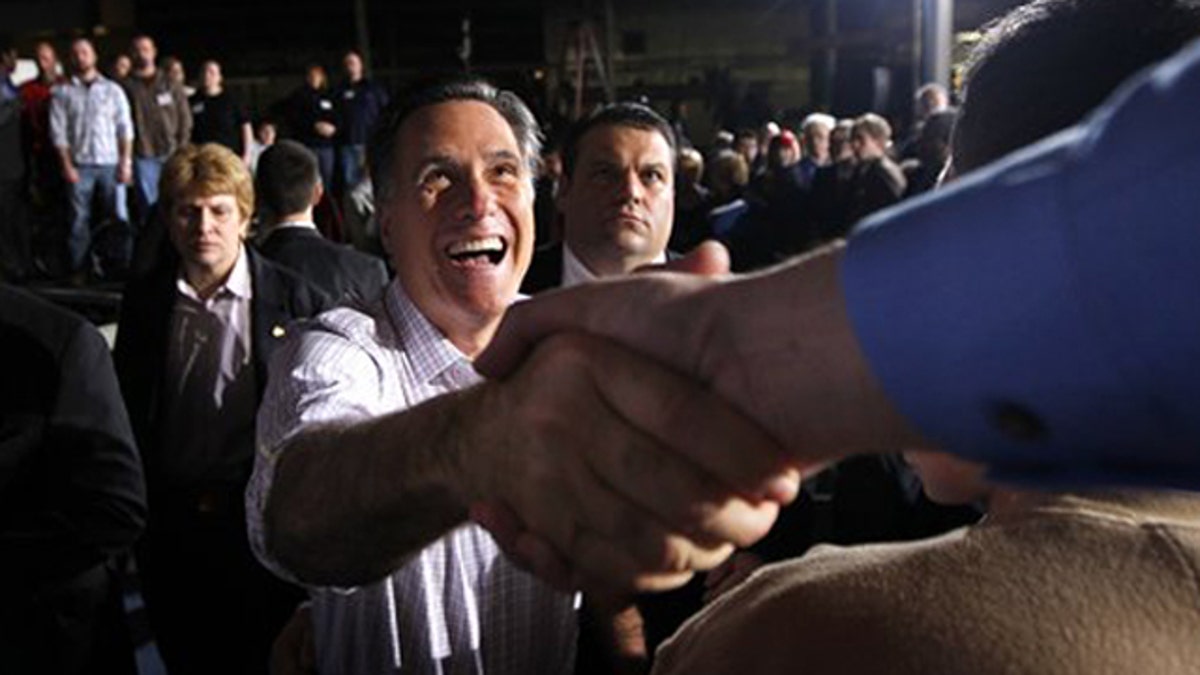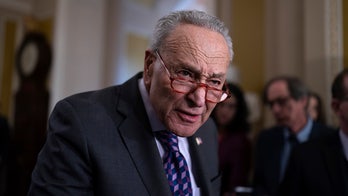
March 3, 2012: Mitt Romney greets supporters at a town hall meeting in Dayton, Ohio. (AP)
Mitt Romney heads into Super Tuesday with a five-state winning streak under his belt, after cruising to victory in the Washington state caucuses Saturday night.
The contest was a blip when compared against the 10-state battle approaching this Tuesday, when 419 delegates are up for grabs. The candidates for days have been campaigning hard in Super Tuesday states like Ohio in hopes of using the high-stakes electoral event to chart a course to the nomination.
Still, the Washington race offered the last chance for momentum ahead of that showdown. With the former Massachusetts governor carrying the state by a double-digit margin, the performance helps him reassert frontrunner status following a string of defeats to Rick Santorum last month.
Romney said he was "heartened" by Saturday's results.
"The voters of Washington have sent a signal that they do not want a Washington insider in the White House," Romney said in a statement. "They want a conservative businessman who understands the private sector and knows how to get the federal government out of the way so that the economy can once again grow vigorously."
With 100 percent of precincts reporting in Washington, Romney was the clear winner with 38 percent.
Ron Paul, with 25 percent, edged out Rick Santorum, who had 24 percent, in the tight battle for second place. Newt Gingrich was a distant fourth with 11 percent.
The Washington caucuses, usually a sleepy and sparsely attended party affair, were both elevated and overshadowed by the Super Tuesday battle. Only Paul, who poured campaign resources into the state in search of his first win, was actually in Washington on Saturday. The rest of the candidates spent the day in Ohio, considered Tuesday's biggest prize.
Still, Washington's position on the calendar, wedged between the contest in Romney's home of Michigan and Super Tuesday, gave it rare sway in the GOP presidential primary season. All the candidates campaigned there at least once. The state offers a total haul of 43 delegates. Though delegates will not be allocated directly out of Saturday's nonbinding straw poll, the contest still gives the winner bragging rights going into Tuesday.
Romney's victory follows wins in Michigan and Arizona this past Tuesday, Wyoming this past Thursday and before that in the low-key Maine caucuses.
Looking ahead to Ohio, Romney got a boost there Saturday when the influential Cleveland Plain Dealer endorsed the former Massachusetts governor. Romney also has been ripping Santorum for a paperwork problem that left his campaign ineligible for 18 of Ohio's 66 delegates.
"Delegates is what it's all about," Romney said.
Santorum, though, said he's "not worried" about such organizational issues.
"It's David and Goliath. I get that," he told Fox News. "And you know what? I know who wins in the end."
Santorum, later at a campaign stop in Ohio, cautioned the GOP against nominating "the moderate" to lead the party into November. "Moderates do not have the best chance of winning," Santorum claimed.
Though Romney has the momentum, it won't be a walk for the delegate frontrunner this coming week.
Gingrich has made delegate-heavy Georgia, which he used to represent in Congress, his firewall state, and recent polls continue to show the former House speaker leading the pack there.
Santorum continues to lead in Ohio polling, though Romney is catching up. Those two states are the biggest delegate prizes on Tuesday. Ohio has the added bonus of being a crucial swing state in the general election with a reputation as the mother of all bellwethers.
Paul, at his post-caucus rally, also assured supporters that his campaign is excelling at the grueling work of attaining delegates over the long run -- though so far he trails in delegates.
"The good news is we're doing very, very well in getting delegates," Paul said. As for his support, Paul said: "The enthusiasm for the cause of liberty continues to grow exponentially."
Gingrich, meanwhile, has started to join Paul in appealing to the frustration among voters with the war in Afghanistan, as protests over the accidental burning of the Koran at a U.S. base coincide with attacks by Afghans which so far have claimed the lives of six U.S. troops.
On Friday, Gingrich uncharacteristically declared "there are limits to American power."
"It's time to face the facts. The period where the United States went out and tried to change a civilization which is rejecting that change is over," Gingrich said.
The statement elicited cheers from the audience, though Gingrich stressed that he wasn't talking about "isolationism" -- something the candidates accuse Paul of advocating.
Ahead of the Washington contest, Romney led in the overall delegate count with 173. Santorum had 87, followed by Gingrich with 33. Paul had 20.
It takes 1,144 delegates to clinch the nomination.




